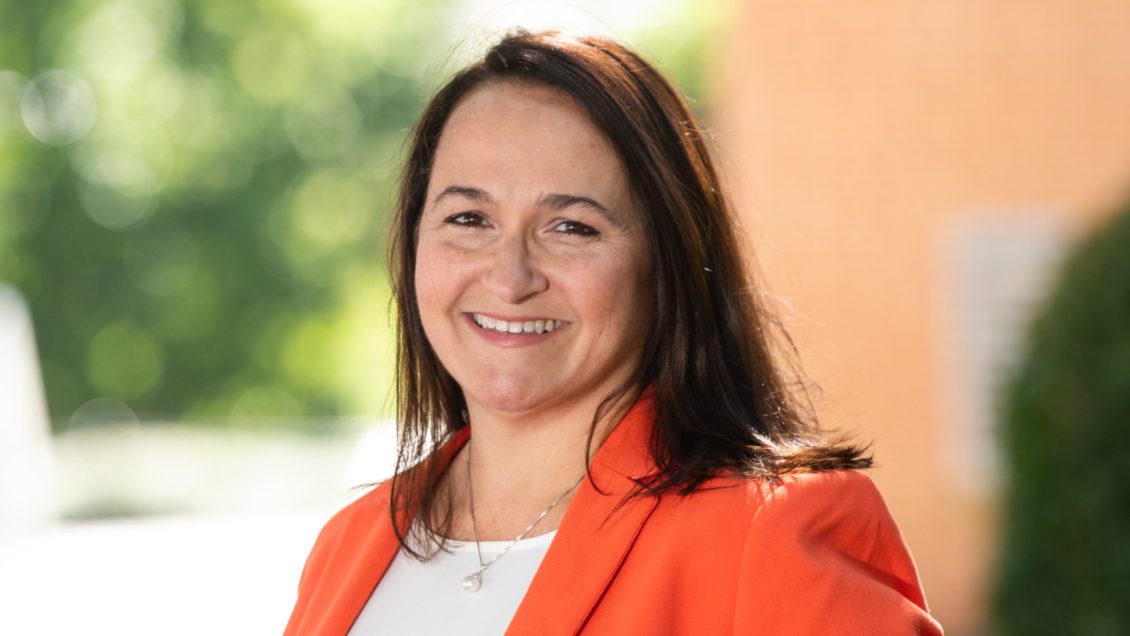As a civil engineering professor at Clemson University, Jennifer Ogle knows her way around campus, but she also understands what it’s like to be a lost first-generation college student because she used to be one.
“I had no one to help me to figure out how to register for classes or how to make my way around campus,” she said of her early days as a freshman at the University of Tennessee, Knoxville. “For me, it was a big pond, and I was a very small fish.”
A small fish she is no longer. Now she’s a roaring Tiger.

Ogle is the new associate chair of Clemson’s Glenn Department of Civil Engineering, a position that has her overseeing adoption of a new curriculum and the opening of freshly renovated classrooms. She plans to bring the sensibilities she developed in her own undergraduate experience to helping today’s students succeed.
The step up the career ladder is her second in just over a year. Ogle was promoted last year to full civil engineering professor, helping break the glass ceiling in a field long dominated by men.
“Dr. Ogle brings a wealth of institutional knowledge as well as a unique set of refined leadership skills, which will help us take this department to the next higher ground,” said Jesus M. de la Garza, the department’s chair. “Dr. Ogle is also committed to a vision that is both student-centric and society-centric.”
Ogle over the past three years has been playing a leading role in restructuring the department as part of a $2 million grant from a National Science Foundation program called Revolutionizing Engineering and Computer Science Departments, or RED.
As part of the restructuring, undergraduates who major in civil engineering will no longer need to wait until senior year to begin working on “keystone” projects that give them the opportunity to tackle real-world challenges.
They instead will start a project-based course sequence in sophomore year and continually refine professional and technical skills until graduation. Students could, for example, work on site development plans, test innovative bio-inspired materials, or help solve flooding problems.
“That’s what they are going to do when they get out of school,” Ogle said. “We’re trying to set up a situation where we are helping develop career-ready civil engineers.”
Eight students began the new approach as a pilot program starting in 2018, and they are on track to finish their projects this academic year, Ogle said. Another cohort of 24 students started this fall, she said.
Ogle said she is now working with faculty to scale and adopt the curriculum. She hopes that by fall 2021, all civil engineering undergraduates will be studying the new curriculum.
“This will be the first civil engineering program that we know of with this kind of design experience woven throughout the entire curriculum,” Ogle said. “Everything that we have done in our program has been done off of a strong backing of engineering education research, and we’ve had a phenomenal response from our students.”
To accompany the new curriculum, the department has embarked on a major renovation of Lowry Hall’s third floor to create technology-infused classrooms where students can work in groups on their projects. The first of three phases has been completed, Ogle said.
“The classrooms have lots of mobile monitors and moveable tables,” she said. “We’re trying to set up a space in which the students can work as teams and in the ways they will work when they graduate and go off into their careers.”
Ogle said the advice of her father, who died shortly after she began college, helped her get through those early days in Knoxville.
“I was never allowed to say ‘I can’t,’” she remembered. “I was always told to say I’ll try. No promises I’ll make it work out, but I’ll try.”
Ogle went on to receive a Bachelor of Science and a Master of Science in civil engineering from the University of Tennessee, Knoxville and then a Ph.D. in civil engineering from the Georgia Institute of Technology.
She has been on the faculty at Clemson since January 2005 and has been an advocate for both faculty and students.
As chair of the Commission on Women, Ogle worked to garner Clemson University President James P. Clements’ support to establish a new childcare facility on campus, which she said is especially important for faculty and staff who want to know that their children are nearby, safe and receiving accredited education. The University’s Early Childhood Education Center has been built and started accepting applications in the spring.
Ogle co-advises, with Professor Wayne A. Sarasua, the student chapter of the Institute of Transportation Engineers.
And she has won accolades for the study-abroad programs she has overseen.
Ogle was the advisor for Clemson Engineers for Developing Countries in 2014 when it won a Heiskell Award from the Institute of International Education. Students in the program helped design and build the first chlorinated water system in Haiti’s Central Plateau.
Ogle also oversees ENGAGE, a program that has sent students to the island nation of Dominica to help with a variety of projects ranging from new facilities for an elementary school to identifying infrastructure needs in the wake of Tropical Storm Erika and Hurricane Maria. She and her students raised nearly $35,000 and send a 20-foot container of tools and supplies to help the community of Soufriere rebuild after the devastation.
“To see the impact our students can have not only here in our own community but around the world, that’s the amazing, fun part of this job,” she said.
Get in touch and we will connect you with the author or another expert.
Or email us at news@clemson.edu

